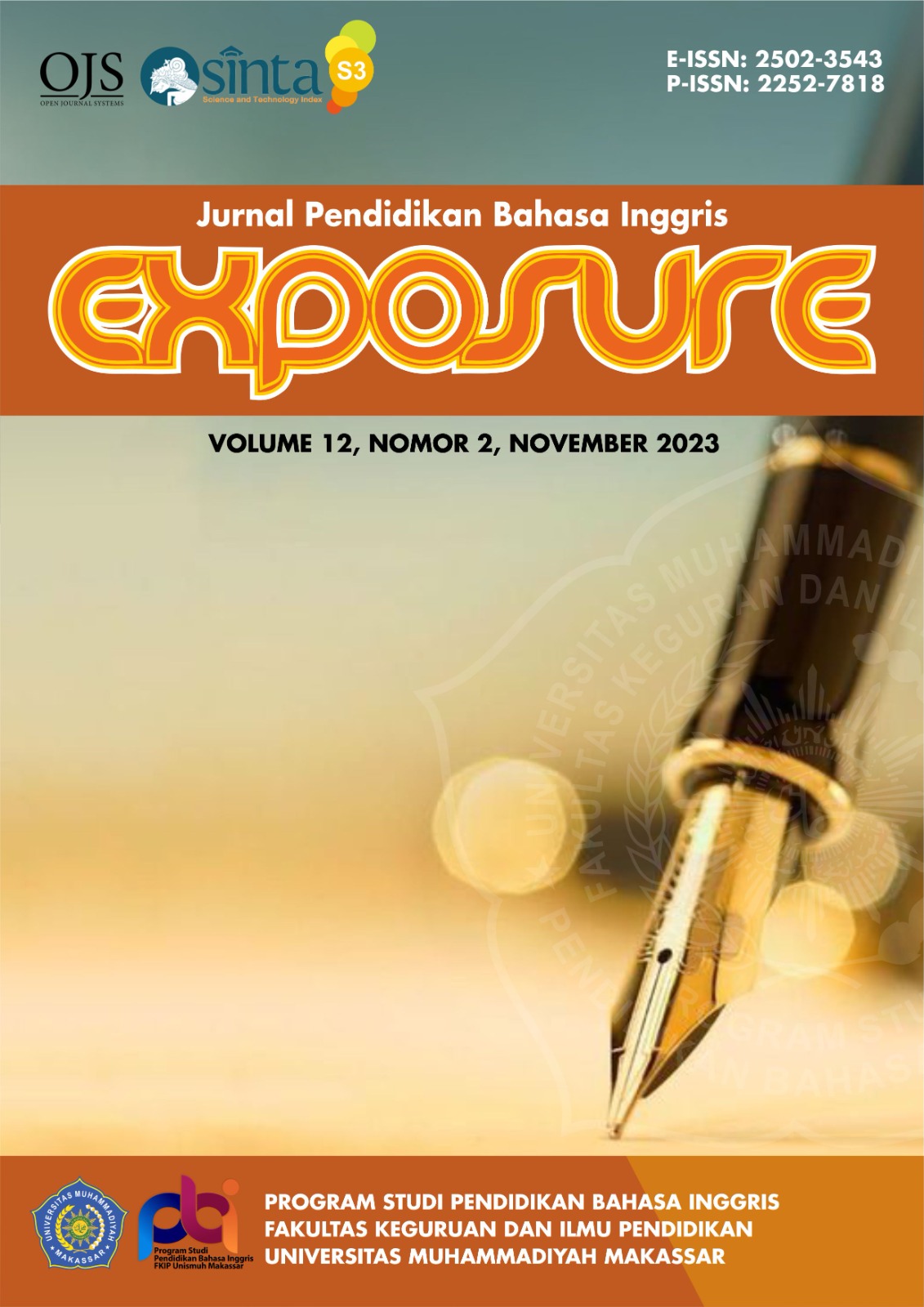PBL METHOD AND LEARNING MOTIVATION ARE INFLUENCED STUDENTS READING COMPREHENSION SKILL
DOI: https://doi.org/10.26618/exposure.v12i2.10693
Problem Based-Learning Method, Conventional Method, Learning Motivation, Reading Comprehension
Abstract
his study aims to find out whether problem-based learning methods and learning motivation have an impact on the reading comprehension skills of eighth-grade students at SMPN 39 Palembang. 60 students from SMPN 39 Palembang were selected as samples for this study using a two-stage random selection procedure during the academic year 2022–2023. A factorial research design was used in this investigation. Tests and questionnaires were used to get the data.. When the data were studied using paired sample t-test, independent sample t-test, and two-way ANOVA test findings of 0.000 > 0.05, it was discovered that problem-based learning methods had a substantial impact on students' reading comprehension skills. Second, problem-based learning techniques have a considerable impact on students with low learning motivation who struggle with reading comprehension. Thirdly, students who use problem-based learning strategies and have high levels of learning motivation have a major impact on their ability to comprehend what they read. Finally, significant interactions between motivation and learning affect how well students understand recount texts taught by PBL and how well they understand SMPN 39 Palembang. Hence, both high and low-learner-motivation students benefited from the PBL approach.
References
Schmidt, H. G. (1993). Foundations of problem-based learning – Some explanatory notes. Medical Education, 27(5), 422–432.
Savery, J.R., & Duffy, T.M. (1995). "PBL: Instructional model and its constructivist framework." Educational Technology, 35(5), 31-37.
Hendry, G.D., & Murphy, L.B. (1995). "Constructivism and problem-based learning," in P. Little, M. Ostwald & G. Ryan (Eds.), Research and Development in Problem-Based Learning, 3: Assessment and Evaluation. Newcastle: Australian Problem-Based Learning Network
Simaibang, B.(2017), English Language Teaching in a foreign Situation. Palembang:CV Citrabooks Indonesia.
Harmer, J. 2007. The Practice of English Language Teaching (4 ed). Longman: Pearson Education Limited.
Warsono & Hariyanto. (2013). Pembelajaran Aktif. Bandung: PT Remaja Rosdakarya.
Fraenkel, J. R, Norman, E. W. and Hellen, H. H. 2012. How to Design and Evaluate Research in Education. Singapore: Mc Grawl Hill.
Pramita Ika, Misdalina,Andinasari:Pengaruh Model Pembelajaran Creative Problem Solving Terhadap Kemampuan Pemecahan Masalah Matematis Dan Disposisi Matematis,Jurnal Pendidikan Matematika,2019(1)
Downloads
Published
How to Cite
Issue
Section
License
Authors who publish with this journal agree to the following terms:
In order to assure the highest standards for published articles, a peer review policy is applied. In pursue of the compliance with academic standards, all parties involved in the publishing process (the authors, the editors and the editorial board and the reviewers) agree to meet the responsibilities stated below in accordance to the Journal publication ethics and malpractice statement.
Duties of Authors:
- The author(s) warrant that the submitted article is an original work, which has not been previously published, and that they have obtained an agreement from any co-author(s) prior to the manuscript’s submission;
- The author(s) should not submit articles describing essentially the same research to more than one journal;
- The authors(s) make certain that the manuscript meets the terms of the Manuscript Submission Guideline regarding appropriate academic citation and that no copyright infringement occurs;
- The authors(s) should inform the editors about any conflict of interests and report any errors they subsequently, discover in their manuscript.
Duties of Editors and the Editorial Board:
- The editors, together with the editorial board, are responsible for deciding upon the publication or rejection of the submitted manuscripts based only on their originality, significance, and relevance to the domains of the journal;
- The editors evaluate the manuscripts compliance with academic criteria, the domains of the journal and the guidelines;
- The editors must at all times respect the confidentiality of any information pertaining to the submitted manuscripts;
- The editors assign the review of each manuscript to two reviewers chosen according to their domains of expertise. The editors must take into account any conflict of interest reported by the authors and the reviewers.
- The editors must ensure that the comments and recommendations of the reviewers are sent to the author(s) in due time and that the manuscripts are returned to the editors, who take the final decision to publish them or not.
Authors are permitted and encouraged to post online a pre-publication manuscript (but not the Publisher’s final formatted PDF version of the Work) in institutional repositories or on their Websites prior to and during the submission process, as it can lead to productive exchanges, as well as earlier and greater citation of published work (see The Effect of Open Access). Any such posting made before acceptance and publication of the Work shall be updated upon publication to include a reference to the Publisher-assigned DOI (Digital Object Identifier) and a link to the online abstract for the final published Work in the Journal.














